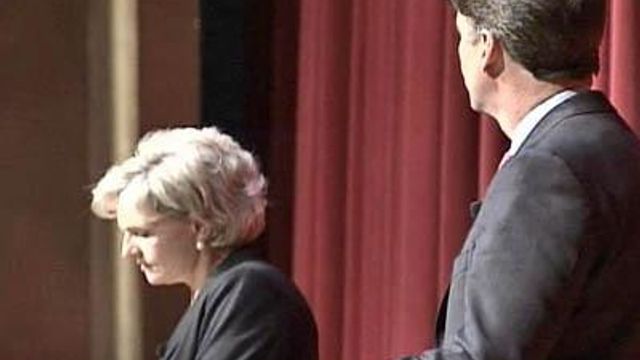Governor Candidates Hit Similar Themes on Education Reform
The five candidates vying to be North Carolina's next chief executive took the stage Tuesday, all promising to attack the state's high dropout rate but failing to agree on how to do it.
Posted — UpdatedThe candidates answered questions during an educators' meeting in Greensboro, with the three Republicans taking on each other before a separate debate between the Democrats.
Among the most pressing issues was helping more high school students graduate. The issue took on a sense of urgency this year after state education officials said only two-thirds of ninth-graders earn a diploma within four years.
The Democratic candidates – Lt. Gov. Beverly Perdue and state Treasurer Richard Moore – debated each other for the first time, trading charges on their legislative records and poking holes in one another's education platforms but generally pointing toward similar goals.
"The issue that is going to be before you and the rest of the voters in choosing the new governor is going to be: who do you think has got the best shot to getting that done," Moore told more than 500 school board members, superintendents and others attending the state School Boards Association annual conference.
"All too often, we celebrate our successes, and we sweep our failures under the rug," Moore said, stressing accountability.
Perdue, meanwhile, focused on her background as a teacher and education advocate.
Both said they were committed to preparing students for high-tech jobs.
Moore has proposed creating a nonprofit to streamline construction and spending for school districts, which face at least $9.7 billion in combined future capital needs statewide.
"That may be a fresh idea, but it sure is a bad idea from my perspective," Perdue said, adding that it would create "a great big new bureaucracy in Raleigh" that would own school buildings in local districts.
In defense, Moore said his plan would only assist districts in accelerating the building process, save money and not own the buildings.
Moore later went on the offense when Perdue highlighted her "college promise" program, which calls on the state to ensure students could attend college debt-free if they keep good grades, stay out of trouble and perform community service.
A similar program was approved by the state Legislature this year with Gov. Mike Easley's support.
Moore said that while Perdue was a state legislator, she sponsored a 1993 provision that would have raised tuition by 29 percent at the University of North Carolina at Chapel Hill and at North Carolina State University.
"Beverly, you were a part of tuition increase after tuition increase," Moore said. "I don't understand, after years of raising tuition, how we are going to turn around and give the college way."
After the debate, Perdue acknowledged she had approved tuition increases but said tuition rates were really low at the time. But she said she was committed - both now and during her 14-year legislative career - to keeping rates low and using other money to improve higher education.
During the hour-long Republican debate, similar themes were sounded among Salisbury attorney Bill Graham, former Supreme Court Justice Bob Orr and state Sen. Fred Smith.
"Education is the most important issue we'll discuss in this campaign," Graham said.
Graham said he believes more focus should be placed on improving middle school achievement and expanding vocational education to reduce the dropout rate. Orr talked about improving teacher quality through professional development to keep educators from leaving the classroom.
"I think we need to re-examine how we finance our schools," Orr said, pushing for equal educational opportunities for low-wealth counties.
Smith kept to his business background by saying children are customers of the education system, adding that money should halt for programs that aren't working.
"We need to encourage vocational education," Smith said.
Murmurs spread through the audience after Smith suggested that home-schooled children should be able to participate in extracurricular activities at local public schools.
"My message stays the same," he said later, acknowledging that many crowd members weren't thrilled about the idea. "I'm not going to pander to any group."
The candidates may have a lot of work to do to increase their name recognition before the primaries in May.
After Graham made the first opening remarks in the Republican debate, a voice from the audience asked that the candidates identify themselves.
"I wasn't sure who was talking until I asked a co-worker here," the woman yelled.
• Credits
Copyright 2024 by WRAL.com and the Associated Press. All rights reserved. This material may not be published, broadcast, rewritten or redistributed.





